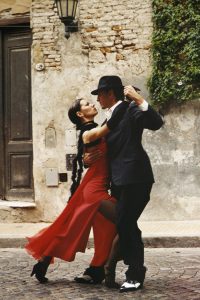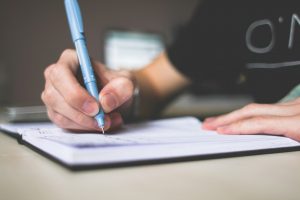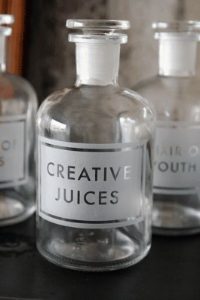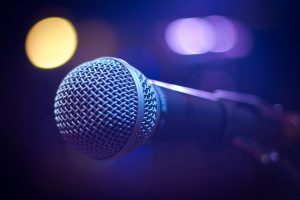
I started my writing career working in busy BBC radio and television newsrooms. The demand of hitting deadlines for hourly news bulletins and regular broadcasts was excellent training in being accurate, quick, and getting things done. Here are three top tips from the newsroom to help you in your business:
1. Plan and prepare
Even with a breaking story, there is always a little time to think about questions to ask interviewees, or what to say on air.
For more regular planned content, I’d always set off on a story with details of where I was going, who I was going to speak to and contact numbers in case of emergency. Having the basics written down, or easily accessible from your mobile device can save a lot of running around.
I’d also spend some time thinking about the story I was going to film or record (often in the car on the way there). Plotting out a simple structure helped me to focus on gathering the interviews and information I needed and made sure I didn’t forget to ask an important question.
For example, the structure for a news feature could be:
- Introduction
- Viewpoint 1
- Opposing viewpoint 2
- What do members of the public think
- Summary
Thinking about the structure of your business content, such as a blog post or newsletter can help you to focus on what you need and stop you getting distracted.
Check out how to write a blog post in one hour for more time-saving tips.
Never miss a deadline - time saving tips from the newsroom for your business Click To Tweet2. Create once, use many
As a radio journalist, I had to write headlines for news bulletins every hour. Often the same story would appear on subsequent bulletins, but by changing the headline, I could give it a new focus. For example, a business story could appear as:
- New factory brings £30 million investment to the North East
- 500 new jobs come to the North East thanks to major factory investment
- North Tyneside mayor says factory investment offers a ‘promise of prosperity’
How to re-use and re-focus content you create for your business
- Record a video on your latest blog topic.
- Create an infographic of a handy how to guide.
- Offer a downloadable template to go with your time-saving tips.
- Ask your customers and fans to vote on new designs for your logo.
There are loads of different ways you can put a new spin on a content idea.
3. Get it done
I learned very quickly that there’s no such thing as another 30 seconds in a newsroom. Content was ready for the deadline or it didn’t make it to air.
Adequate and on time always beats perfectly late. That’s been a valuable lesson throughout my writing and business career.
Adequate and on time always beats perfectly late. Click To TweetIt’s understandable that you want the content you create or the tasks you complete for your business to be perfect. To sweat over every little detail. Change your mind a dozen times and then go back to how it was originally.
Remember, your customers, your audience only see the finished results. They can only respond to what you publish, or create. And if it takes you forever to do it, they may lose interest and move on.
You wouldn’t watch a blank TV screen would you? Or listen to static on the radio?
Set your deadline, stick to it and publish.
Additional tip: The handover
At the end of each shift in the newsroom, I would leave instructions in a handover note to the person on the next shift.
Even if you’re not handing over to anyone else in your business, think about what you can do to set yourself up for a good start each day.
At the end of each day at the writing desk, I write a to-do list for the next day’s activities. Plans may change, just like they do in the newsroom, but it’s always a good place to start.
For more on how lessons for the newsroom can help you make decisions, work to deadlines and trust in your team, check out John Young Media.
For more writing, marketing and time saving tips, sign up to my mailing list.


 That’s how you end up with nonsense like “leveraging our partner ecosystem” and “assuring you of our best attention” (an email sign off that I used to see on a daily basis).
That’s how you end up with nonsense like “leveraging our partner ecosystem” and “assuring you of our best attention” (an email sign off that I used to see on a daily basis). In writing for clients I have to adopt voices. It’s a bit like being a impressionist. I listen to them talk about their business. I read their written content carefully. I look for words and phrases they use and mimic their rhythm and style.
In writing for clients I have to adopt voices. It’s a bit like being a impressionist. I listen to them talk about their business. I read their written content carefully. I look for words and phrases they use and mimic their rhythm and style. Often my job is to give your communication clarity. That means structure and punctuation that makes it easy to read. It’s a bit like a singing coach showing you where to breathe when singing a complicated line.
Often my job is to give your communication clarity. That means structure and punctuation that makes it easy to read. It’s a bit like a singing coach showing you where to breathe when singing a complicated line. Do you ever think I don’t know what to write? I’ve said all that already? There’s nothing new to add?
Do you ever think I don’t know what to write? I’ve said all that already? There’s nothing new to add? 2. Pick a sentence at random
2. Pick a sentence at random

 When Robert Frost wrote: “No tears in the writer, no tears in the reader,” he was talking about the power of poetry to connect writer and reader through empathy and shared experience.
When Robert Frost wrote: “No tears in the writer, no tears in the reader,” he was talking about the power of poetry to connect writer and reader through empathy and shared experience.

 Just write. Take your pen or pencil and move it on the paper. Write as quickly as you can, without thinking too much about what you want to write.
Just write. Take your pen or pencil and move it on the paper. Write as quickly as you can, without thinking too much about what you want to write. Free writing is useful for any kind of writing, not just for self discovery. It gets you started and gives a structure.
Free writing is useful for any kind of writing, not just for self discovery. It gets you started and gives a structure. Free writing also helps me reflect. I turn off the screen, eliminate any distractions and just spend time with my pen and notebook. My handwriting becomes very untidy and often I don’t write in full sentences. But as I do it, I can feel a sense of calm, like I’m taking deeper breaths, or spending some time meditating.
Free writing also helps me reflect. I turn off the screen, eliminate any distractions and just spend time with my pen and notebook. My handwriting becomes very untidy and often I don’t write in full sentences. But as I do it, I can feel a sense of calm, like I’m taking deeper breaths, or spending some time meditating. As part of an agency, I got used to working with a tight-knit team creating concepts and visions for creative campaigns. We quickly moved from ‘That’s my idea, that’s your idea…’ to ‘That’s a great idea – how do we build on that?’ We trusted each other to work towards a shared goal of creating something that was bigger and better than the sum of our individual inputs.
As part of an agency, I got used to working with a tight-knit team creating concepts and visions for creative campaigns. We quickly moved from ‘That’s my idea, that’s your idea…’ to ‘That’s a great idea – how do we build on that?’ We trusted each other to work towards a shared goal of creating something that was bigger and better than the sum of our individual inputs. I’ve benefited from lots of great free advice. But I’m a firm believer that it’s worth while paying an expert to help in areas where I lack the skills, knowledge or time to do something properly.
I’ve benefited from lots of great free advice. But I’m a firm believer that it’s worth while paying an expert to help in areas where I lack the skills, knowledge or time to do something properly. However well I prepare for a meeting or a call with a potential new client, there’s always the element of the unexpected.
However well I prepare for a meeting or a call with a potential new client, there’s always the element of the unexpected. I found a great tribe of slightly mad people to support my running and triathlon adventures in the online community of
I found a great tribe of slightly mad people to support my running and triathlon adventures in the online community of  Who says you have to write a blog? Why not use video or photographs?
Who says you have to write a blog? Why not use video or photographs? As a creative copywriter, I had to generate lots of ideas for marketing campaigns. Here, working with other creative people really helped me to bounce ideas around, and spark new ones from others’ input. The trick was not to dismiss any idea straight away, to keep on generating them and only then start to apply filters about what would work well.
As a creative copywriter, I had to generate lots of ideas for marketing campaigns. Here, working with other creative people really helped me to bounce ideas around, and spark new ones from others’ input. The trick was not to dismiss any idea straight away, to keep on generating them and only then start to apply filters about what would work well. My brilliant writing mentor
My brilliant writing mentor  A copywriter knows what style of writing works best for different media.
A copywriter knows what style of writing works best for different media. Do you talk the language of your customers? Are you trying to sell a drop-forged, chrome-coated,open-ended spanner, when your customer is looking for a tool to loosen off a nut?
Do you talk the language of your customers? Are you trying to sell a drop-forged, chrome-coated,open-ended spanner, when your customer is looking for a tool to loosen off a nut? How often do you find yourself in the middle of something, when your phone rings, or someone asks you a question, or an email pops up to distract you?
How often do you find yourself in the middle of something, when your phone rings, or someone asks you a question, or an email pops up to distract you?